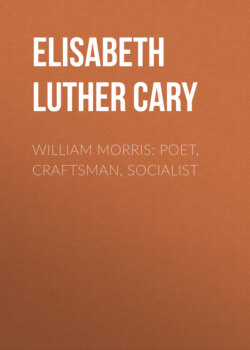William Morris: Poet, Craftsman, Socialist

Реклама. ООО «ЛитРес», ИНН: 7719571260.
Оглавление
Elisabeth Luther Cary. William Morris: Poet, Craftsman, Socialist
William Morris: Poet, Craftsman, Socialist
Table of Contents
PREFACE
CHAPTER I
CHAPTER II
CHAPTER III
CHAPTER IV
CHAPTER V
CHAPTER VI
CHAPTER VII
CHAPTER VIII
CHAPTER IX
CHAPTER X
CHAPTER XI
CHAPTER XII
BIBLIOGRAPHY[5]
Отрывок из книги
Elisabeth Luther Cary
Published by Good Press, 2021
.....
“William Morris.”
These letters emphasise in a single instance what the close student of Morris will find emphasised at every turn in his career,—the persistent and strong influence over him of the tastes and occupations of his boyhood. Unless this is kept constantly in mind, it is easy to fall into the common error of regarding the various activities into which he threw himself as separate and dissociated instead of seeing them as they were, component parts of a perfectly simple purpose and unalterable ideal. With most men who are on the whole true to the analogy of the chambered nautilus and cast off the outworn shell of their successive phases of individuality as the seasons roll, the effect of early environment and tendency may easily be exaggerated, but Morris grew in the fashion of his beloved oaks, keeping the rings by which his advance in experience was marked; at the end all were visible. His education began and continued largely outside the domain of books and away from masters. His wanderings in the depths of the quaint and beautiful forest, his intimate acquaintance with the nature of Gothic architecture, his familiarity with Scott, his prompt adoption of Ruskin, all these formed the foundation on which he was to build his own theory of life, and all were his before he went up to Oxford. They prepared him for the many-sided profession, if profession it can be called, which was to absorb and at last to exhaust his mighty energy. It was the tangible surface of the world that most inspired him in boyhood and in maturity. Loving so much even as a child its aspects, its lights and shadows, the forms of trees and birds and beasts, the changes of season, the lives of men living close to “the kind soil” and in touch with it through hearty manual labour, it was but a step to the occupations that finally engrossed him. He never got so far away from the visions of his youth as to forget them. In one form or another he was constantly trying to embody them that others might see them with his eyes and worship them with his devotion. “The spirit of the new days, of our days,” says the old man in News from Nowhere, “was to be delight in the life of the world, intense and almost overweening love of the very skin and surface of the earth on which man dwells.”
.....